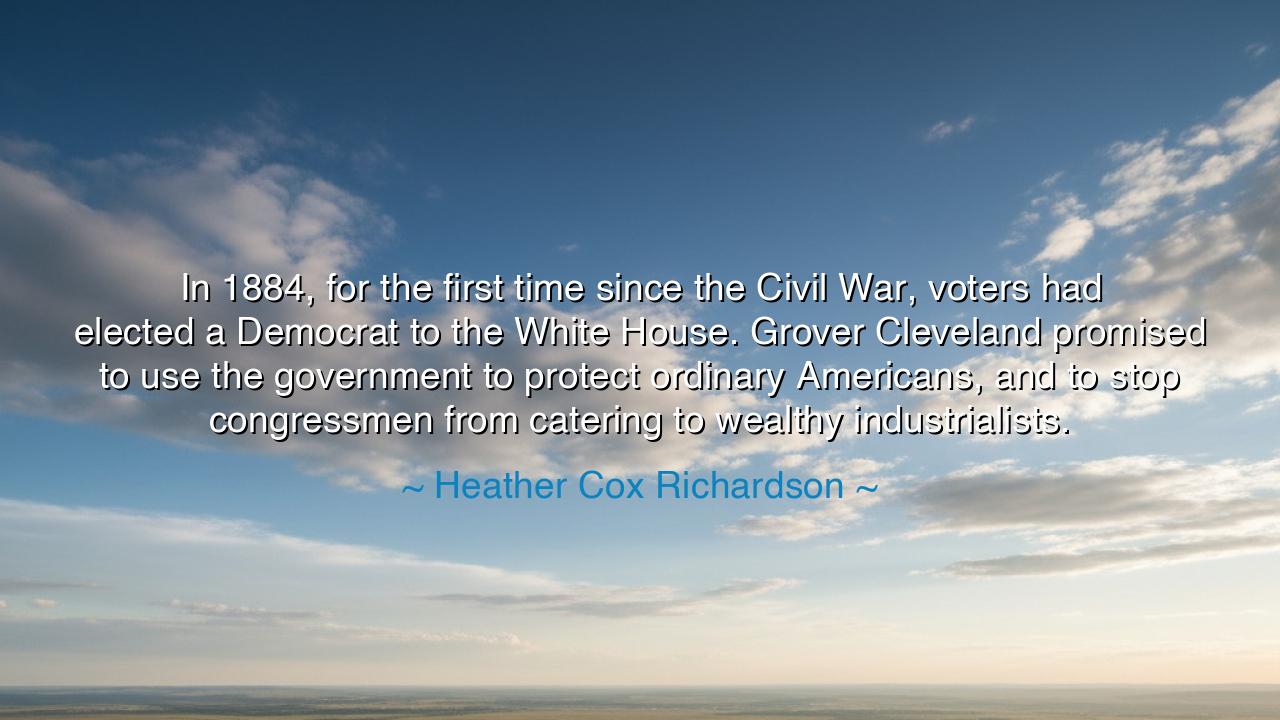
In 1884, for the first time since the Civil War, voters had
In 1884, for the first time since the Civil War, voters had elected a Democrat to the White House. Grover Cleveland promised to use the government to protect ordinary Americans, and to stop congressmen from catering to wealthy industrialists.






In the quiet turning of history’s wheel, when the wounds of war had not yet faded from the hearts of men, Heather Cox Richardson, the historian of conscience and democracy, recalled a moment that glimmered with both promise and peril. She wrote: “In 1884, for the first time since the Civil War, voters had elected a Democrat to the White House. Grover Cleveland promised to use the government to protect ordinary Americans, and to stop congressmen from catering to wealthy industrialists.” These words carry more than a recounting of fact—they resound with the eternal struggle between power and principle, between the common people and the gilded towers of privilege. In them, we hear the heartbeat of a republic seeking to remember its soul.
To understand the meaning of this quote, we must first see the world as it stood in that year of 1884. The Civil War had ended two decades before, yet its shadow still stretched across the land. The Union had triumphed, but the nation was fractured in spirit—its people divided not only by region, but by class. The fires of industrialization had forged a new era of power, where vast fortunes rose like mountains and common laborers toiled in their shadow. Railroads stitched the country together, but they were owned by a few; factories brought progress, but they devoured lives. Corruption had seeped into the very veins of government, and many who sat in Congress bowed before the golden idols of monopoly and greed.
It was in this turbulent age that Grover Cleveland rose to prominence. A man of stern integrity and unyielding will, he stood apart from the political machines of his time. His election as the first Democrat since the Civil War was more than a shift in power—it was a signal that the people longed for something purer, more honest. Heather Cox Richardson’s words capture the spirit of that moment, when Cleveland “promised to use the government to protect ordinary Americans”—to make it once again a servant of the people rather than a tool of the rich. It was a call back to the ancient ideal that government exists not for the comfort of the few, but for the welfare of all.
And yet, his task was not an easy one. For the Gilded Age, as history would name it, was an age of dazzling wealth and hidden decay. Men like Carnegie, Vanderbilt, and Rockefeller towered over the nation as kings of commerce, while farmers and workers struggled to survive. The poor saw that their sweat built the fortunes of others, and that their votes were bought and sold in the smoky halls of politics. Against such forces, Cleveland sought to bring reform—to curb corruption, to restrain the power of monopolies, and to restore faith in government. In doing so, he carried forward the ancient belief that justice must be the guardian of strength, and that power without virtue is but tyranny in disguise.
The lesson of this moment, as Richardson reveals, lies not merely in the politics of the past, but in the nature of governance itself. Every age faces the same temptation—to let wealth and influence dictate the course of the state. And every generation must decide anew whether government shall serve the powerful or the people. Cleveland’s promise, though made in the nineteenth century, echoes the vow that every true leader must make: to remember that the purpose of government is protection, not privilege; to stand as a shield for the weak, not a ladder for the ambitious.
History is filled with the rise and fall of such ideals. In ancient Rome, the Republic collapsed when senators ceased to serve the people and instead served their own greed. The same pattern repeats wherever men forget that power is a trust, not a possession. Cleveland’s struggle was no different—he stood against entrenched corruption, knowing that victory might never be complete. But as with all righteous endeavors, the virtue lay in the striving itself. His presidency marked not the end of greed, but a rekindling of hope—that even in an age of cynicism, integrity could still lead.
Thus, my children of the present age, heed this lesson from the past: government is only as good as the conscience of its citizens. If you would have leaders who serve the people, you must be a people worthy of service—watchful, courageous, unwilling to trade liberty for comfort or justice for convenience. Demand honesty, not flattery; fairness, not favor. Do not let your government become a marketplace of influence, where laws are sold to the highest bidder. Remember that the work of Grover Cleveland, and the truth told by Heather Cox Richardson, are not relics of history, but mirrors of our own time.
For the promise of good governance is like the flame of democracy itself—it must be guarded, renewed, and tended by every generation. When leaders forget their duty to the people, remind them. When the powerful seek to rule through gold rather than justice, resist them. And when despair whispers that corruption is eternal, remember this: though no nation is perfect, every nation can strive for righteousness. For in that striving lies the noblest work of all—the eternal labor of building a government that truly serves its people, not its masters.






AAdministratorAdministrator
Welcome, honored guests. Please leave a comment, we will respond soon